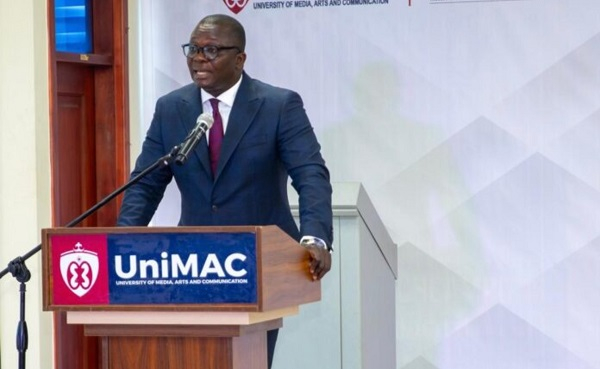Member of Parliament for Abetifi, Dr. Bryan Acheampong has issued a call for the development of a comprehensive National Skills Plan for the Artificial Intelligence (AI) Transition, warning that without it, Ghana risks widening inequality and missing out on the transformative potential of AI in job creation.
He made this charge while delivering a public lecture on yesterday at the University of Media, Arts and Communication (UniMAC), themed “AI Disruptions and the Future of Work: Readiness of our Youth.”
The event, which drew academics, students, industry professionals, and policymakers, was part of the University’s Distinguished Speakers Series.
Dr. Acheampong emphasised that Ghana’s youthful population and increasing digital penetration offer unique advantages, but these can only be translated into economic value if young people are trained to compete and collaborate with intelligent systems.
“The next generation of Ghanaian workers will not compete with machines—they will collaborate with them. But collaboration requires preparation,” he stated.
Dr. Acheampong proposed that a Ghana Skills for AI Transition Plan should be developed through coordinated efforts involving the Ministry of Education, Youth Employment Agency (YEA), and private sector partners.
This, he said, must include vocational training, digital apprenticeships, scholarships, micro-credentials, and community-based AI awareness programmes.
He explained that while Science, Technology, Engineering and Mathematics (STEM) education remains critical, Ghana’s AI transition must go further by localising AI education and linking it with sectors like agriculture, journalism, health, and creative arts.
“This is not just about STEM. It’s about STEM with context— teaching students how to use AI in the fields they live and work in,” he added.
He said Ghana’s readiness must extend beyond urban centres and elite institutions.
He insisted that informal workers, rural youth, teacher trainees, and artisans must also be included in Ghana’s digital learning journey.
His remarks were backed by data and case studies from his own doctoral research on institutional responsiveness and technological trust.
He explained how poorly designed reforms and lack of end-user engagement often result in failure of digital tools in public institutions.
To avoid similar pitfalls in Ghana’s AI journey, he called for an education model that blends theoretical knowledge with real-world application. Universities, he suggested, should act as innovation hubs where students co-create with AI, engage in design thinking, and receive industry exposure through fellowships and project-based learning.
“We must rethink not only what we teach, but how we teach. The classroom must evolve into a collaborative innovation lab,” he said.
The speech painted a realistic but urgent picture. From digital exclusion in rural areas to algorithmic bias in imported systems, Dr. Acheampong laid out the risks of proceeding without a skills framework.
He pointed out that AI technologies, if not deployed ethically and inclusively, could reinforce existing inequalities in employment, access, and opportunity.
He urged Ghana to learn from the experience of other countries and proactively craft a roadmap that ties AI adoption to economic transformation.
He noted that while Rwanda has already launched a national AI strategy, Ghana remains without a central document to guide investment, training, or regulation.
Throughout the lecture, Dr. Acheampong emphasized that Ghana’s digital future must be shaped by its people and grounded in its context.
He advocated for cross-sector partnerships between academia, government, civil society, and the private sector to co-develop a nationally relevant AI agenda.
In a message directed at the youth, he encouraged students to take ownership of the future and build not just technical skills, but also critical thinking, ethical reasoning, and creativity, skills that remain irreplaceable even in the age of machines.
“Whether you’re scripting a documentary, running a grassroots campaign, building a social enterprise, or hosting a podcast, AI will influence how you ideate, execute, and scale. So embrace it, not passively, but purposefully,” he urged.
The MP pointed out that countries like Rwanda have already launched national AI strategies and begun deploying the technology in healthcare and agriculture. Ghana, he said, risks falling behind unless it develops its own roadmap that reflects local development goals and protects data sovereignty.
Dr. Acheampong’s remarks come amid growing concern that many African countries are embracing AI without adequate policy or legal safeguards, potentially leaving populations vulnerable to data exploitation, job displacement, and widening inequality.
He urged policymakers to act decisively to create the institutional and legal infrastructure needed to manage AI’s rapid integration into the economy and society. Without this, he said, AI will not fulfil its potential to boost productivity, enhance service delivery, or improve livelihoods.
“The real question is not whether we will use AI,” Dr. Acheampong said, “but whether we will lead it, shape it, and deploy it to serve Ghanaian lives and livelihoods.”
How social engineering hacks your mind and your bank account
